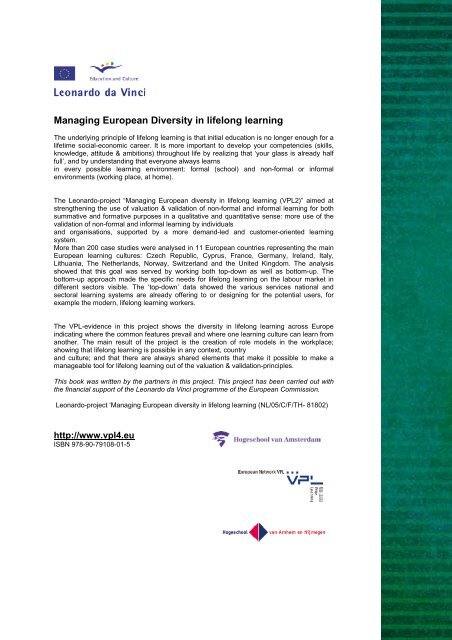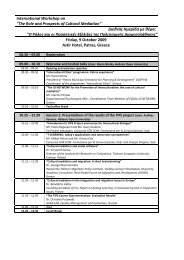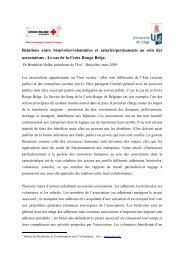- Page 1:
The many perspectives of the Valuat
- Page 4 and 5:
Managing European diversity in life
- Page 6 and 7:
ing and creating zones of mutual tr
- Page 9 and 10:
Preface 3 by Ruud Duvekot Diagnosis
- Page 11 and 12:
RUUD DUVEKOT, GREG SCANLON, ANNE- M
- Page 13 and 14:
learning, while social partners and
- Page 15 and 16:
The project aimed at strengthening
- Page 17 and 18:
learner gets a real say in lifelong
- Page 19 and 20:
Taking all the lessons into conside
- Page 21 and 22:
In this book we aim at showing the
- Page 23 and 24:
esponse to the draft occupational a
- Page 25 and 26:
- lifelong - learning. Surely a rel
- Page 27 and 28:
tems of identification and validati
- Page 29 and 30:
ANNE- MARIE CHARRAUD & RUUD DUVEKOT
- Page 31 and 32:
approaches demonstrating where the
- Page 33 and 34:
showing shared strenghts (cost redu
- Page 35 and 36:
2.4 Individual’s background befor
- Page 37 and 38:
Leonardo project VPL-2 Partner: …
- Page 39 and 40:
3.8 How is informal learning measur
- Page 41 and 42:
Case studies concerning: ………
- Page 43 and 44:
a. Linked to certification, diploma
- Page 45 and 46:
ORGANISATION INDIVIDUAL Profit Non-
- Page 47 and 48:
O P P O R T U N I T I E S 96. Marke
- Page 49 and 50:
T H R E A T S 188. Lack of understa
- Page 51:
On the basis of the key-issues fill
- Page 54 and 55:
Answers on these questions offer in
- Page 56 and 57:
The cross-case analysis was aimed t
- Page 58 and 59:
The panel members were VPL experts
- Page 60 and 61:
In the profit sector VPL is viewed
- Page 62 and 63:
Most label-categories can be applie
- Page 64 and 65:
competencies. In the profit sector
- Page 66 and 67:
informal learning and no “etiquet
- Page 68 and 69:
In the case-descriptions, not many
- Page 70 and 71:
There are few threats seen in trans
- Page 72 and 73:
The amount of empirical data offere
- Page 74 and 75:
In the case studies the following k
- Page 76 and 77:
- Getting qualified - Formal recogn
- Page 78 and 79:
- Gain formal certification for lea
- Page 80 and 81:
In the cases the following keywords
- Page 82 and 83:
Whether the EQF actually will funct
- Page 84 and 85:
come or competence based approach,
- Page 86 and 87:
and informal learning. The importan
- Page 88 and 89:
cation and training system, for exa
- Page 90 and 91:
It is possible to see the EQF-appro
- Page 92 and 93:
tions (or part qualifications) on t
- Page 94 and 95:
non-formal and informal learning fr
- Page 96 and 97:
The development of the EQF and corr
- Page 98 and 99:
Particular attention has been paid
- Page 100 and 101:
The practice of teaching is underpi
- Page 102 and 103:
Autonomy and Accountability: - Take
- Page 104 and 105:
necessity — for if older people a
- Page 106 and 107:
different contexts, and around how
- Page 108 and 109:
- If eligible, applicant will be re
- Page 110 and 111:
were guided by the project tutor in
- Page 112 and 113:
the response from the relevant depa
- Page 114 and 115:
The RPL process, initiated as part
- Page 116 and 117:
came to the process in differing wa
- Page 119 and 120:
RUUD DUVEKOT Throughout history,
- Page 121 and 122:
2 Identification of competencies; 3
- Page 123 and 124:
The glass is half full (VPL Working
- Page 125 and 126:
Since time immemorial, learning has
- Page 127 and 128:
After the fall of guild education,
- Page 129 and 130:
technical full-time education and t
- Page 131 and 132:
The new standard became a (starting
- Page 133 and 134:
current competency level on the lab
- Page 135 and 136:
used (nationally applicable MBO 35a
- Page 137 and 138:
like. These volunteer positions are
- Page 139 and 140:
Initial professional training Initi
- Page 141 and 142:
After phase 2, the content of the p
- Page 143 and 144:
3. determination of organizational
- Page 145 and 146:
The individual is not yet used to d
- Page 147 and 148:
In the area of civil effect, extend
- Page 149 and 150:
Goudswaard, N.B. (1981). Vijf en ze
- Page 151 and 152:
ANNE- MARIE CHARRAUD The French app
- Page 153 and 154:
ing. The same qualification and so
- Page 155 and 156:
ut one quarter of the membership mu
- Page 157 and 158:
2 - A new way to describe qualifica
- Page 159 and 160:
The more recent data describing the
- Page 161:
and the assessment of portfolios. I
- Page 164 and 165:
Nordic cooperation has a widespread
- Page 166 and 167:
Government’s initiatives to furth
- Page 168 and 169:
educational, working life and third
- Page 170 and 171:
In Sweden there have been developed
- Page 172 and 173:
working life and education sector i
- Page 174 and 175:
Different methods and tools for map
- Page 177 and 178:
BÉNÉDICTE HALBA Managing European
- Page 179 and 180:
skills, early school leavers, the l
- Page 181 and 182:
- the building of a common portfoli
- Page 183 and 184:
time to volunteering. A social coun
- Page 185 and 186:
Distinctive traits of civil society
- Page 187 and 188:
in 2001, by the United Nations, has
- Page 189 and 190:
VPL strategies are strongly based o
- Page 191 and 192:
project that their employees valued
- Page 193 and 194:
ANITA CALONDER GERSTER & KEES SCHUU
- Page 195 and 196:
manage their potential, to steer th
- Page 197 and 198:
II Creating specific processes, pro
- Page 199 and 200:
2.a ...INCLUDE ALL AREAS OF LIFE Do
- Page 201 and 202:
and telling them that it is their r
- Page 203 and 204:
B Creating specific processes, proc
- Page 205 and 206:
A lady who followed an outplacement
- Page 207 and 208:
Frame laws, decrees, norms, regulat
- Page 209 and 210:
- Personality-/dataprotection in re
- Page 211 and 212:
2.d Does the VPL system promote per
- Page 213:
6 Standards, structures, quality as
- Page 216 and 217:
Approach’. The resulting 3x3 matr
- Page 218 and 219:
For some of the steps mentioned abo
- Page 220 and 221:
At the end of the assessment the as
- Page 222 and 223:
Abrahamse, P. (2006) Action Learnin
- Page 224 and 225:
agreement among the Ministry of Edu
- Page 226 and 227:
health and some health-related comp
- Page 228 and 229:
in terms of enhancement of self-est
- Page 230 and 231:
duration of the education. This can
- Page 232 and 233:
I am convinced that there are more
- Page 234 and 235:
The costs of a VPL procedure depend
- Page 237 and 238:
ANETT WALTER After working on the t
- Page 239 and 240:
who are already unemployed or with
- Page 241 and 242:
All in all, Sven was an expert in w
- Page 243 and 244:
A very special project has been dev
- Page 245 and 246:
Today Petra is working at the recep
- Page 247: measure forms of non-formal and inf
- Page 250 and 251: the democratisation of education wh
- Page 252 and 253: their graduates also have direct ac
- Page 254 and 255: Recently, the National Qualificatio
- Page 256 and 257: The pilot implementation project UN
- Page 258 and 259: The assessment standard should be i
- Page 260 and 261: Results of the EPANIL project have
- Page 262 and 263: segment), however an absolute major
- Page 264 and 265: and other tools necessary for the i
- Page 266 and 267: experiential learning in the same f
- Page 269 and 270: ERICA AALSMA, RUUD DUVEKOT & LEX SA
- Page 271 and 272: - Does the board and management end
- Page 273 and 274: - Is there a view of the options fo
- Page 275 and 276: - Does the employee have a perspect
- Page 277: - Is the employee in a position to
- Page 280 and 281: The Ministry for Education and Cult
- Page 282 and 283: to rectify any shortcomings by eith
- Page 284 and 285: that lesson her personality was ass
- Page 286 and 287: 284
- Page 288 and 289: Paul Bonsema is a senior lecturer a
- Page 290 and 291: Luca Ferrari is a junior researcher
- Page 292 and 293: gies; research and selection of lea
- Page 294 and 295: tional psychology and pedagogics. S
- Page 296 and 297: INSTITUT LILLOIS D’EDUCATION PERM




